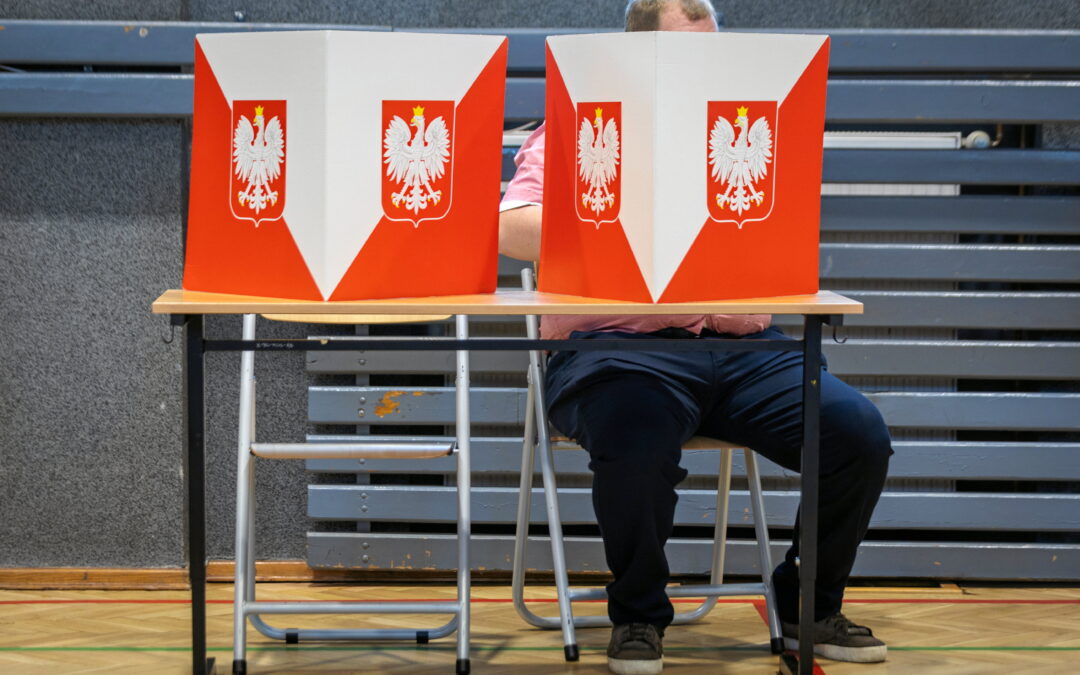Keep our news free from ads and paywalls by making a donation to support our work!

Notes from Poland is run by a small editorial team and is published by an independent, non-profit foundation that is funded through donations from our readers. We cannot do what we do without your support.
Poland’s presidential run-off that took place on 1 June and was won by Karol Nawrocki, an independent candidate supported by the opposition national-conservative Law and Justice (PiS), was “competitive and well managed” and “fundamental freedoms were respected”, the Organization for Security and Co-operation in Europe (OSCE) has found.
However, it also noted “inadequate campaign finance regulations” leading to “several third parties” campaigning in favour of Nawrocki’s opponent, Rafał Trzaskowski, the candidate of Poland’s main ruling party, the centrist Civic Platform (PO).
The OSCE’s report, published on 2 June, follows an earlier one published after the first round of the election, which pointed to a “highly polarized political environment” and media landscape that limited voters’ access to impartial information.
The first round of Poland's presidential election was "competitive" with "no incidents or serious procedural shortcomings", an @OSCE report has found.
But it warned that a highly-polarised environment limited voters’ access to impartial informationhttps://t.co/b07pS39omF
— Notes from Poland 🇵🇱 (@notesfrompoland) May 20, 2025
The run-off report was based on the findings of an international team of 42 observers from 24 countries, including delegations from the Office for Democratic Institutions and Human Rights (ODIHR) and the Parliamentary Assembly of the Council of Europe (PACE).
In the report, the OSCE concluded that “as in the first round, the freedoms of expression, association, and peaceful assembly were respected” and the election was “competitive and well managed”.
At the same time, the organisation noted several doubts over campaign financing, with the main concern being “insufficient campaign finance regulations, including lack of reporting requirements before the second round and absence of third-party campaigning provisions”.
The OSCE wrote that “several third parties, including civil society organizations, engaging in election observation and voter mobilization activities, conducted campaigns incurring significant expenditures” in favour of Trzaskowski.
It pointed to two new Facebook profiles that from 16 April until 14 May paid a total of around 500,000 zloty (€117,000) for 136 video ads on Facebook in favour of Trzaskowski and against Nawrocki and Sławomir Mentzen, the far-right Confederation (Konfederacja) party candidate who finished third in the first round.
The OSCE added that both ads were later referred to Poland’s Internal Security Agency (ABW) for investigation but that the handling of the case by public institutions, including NASK, a Polish state research institute tasked with monitoring cyberthreats, “raised concerns”.
The report particularly criticised “the delayed and contradictory public communications and the lack of transparency regarding findings and measures taken” and pointed out that it might impact public trust in the institutions.
The OSCE also noted that “the longstanding political polarization and societal divide deepened between the two rounds”. It pointed in particular to a high level of polarisation between the country’s two main political camps and media bias.
It gave the examples of state broadcaster TVP as well as private TV station TVN and news website Onet being critical of Nawrocki and more favourable towards Trzaskowski in their coverage, with the conservative TV Republika showing a “more pronounced bias” in the opposite direction.
The report also highlighted that “there was no clear separation between campaigning and the activities of public officials” as shortly after the first round vote, incumbent President Andrzej Duda and Prime Minister Donald Tusk renewed their endorsements of Nawrocki and Trzaskowski, respectively.
The victory of @NawrockiKn, who has never previously stood for elected office, in Poland's presidential election is remarkable, writes @danieltilles1.
It is a huge blow to @donaldtusk’s government but also presents questions for the right-wing opposition https://t.co/OlpXZM01Ng
— Notes from Poland 🇵🇱 (@notesfrompoland) June 2, 2025
The OSCE also noted the ongoing issues with the legal system in Poland, pointing to “the lack of independence of the supreme court chamber established in 2018 that is responsible for validating election results” which “has lowered public trust in the judiciary”.
It was referring to the Supreme Court’s chamber of extraordinary review and public affairs, created as part of the PiS party’s judicial reforms when it was in power and regarded as illegitimate by Tusk’s government.
Assessing the situation, Dunja Mijatović, head of the ODIHR observation mission, stressed that “genuine democracy should not be a zero-sum game, it is a shared responsibility” and called on politicians to strengthen the trustworthiness and accountability of democratic institutions.
Meanwhile, Iulian Bulai, head of the PACE delegation, highlighted that the high voter turnout in the second round – which stood at 71.63% and was the highest ever in the history of Poland’s presidential elections – “reflects the strong commitment of Polish citizens to the strength and quality of their democracy”.
“Voters were presented with a real choice between political alternatives in an open environment,” he added. That meant they could make informed decisions, “despite a highly polarised media landscape, manipulative rhetoric and existing vulnerabilities”, which should be dealt with to “further strengthen the integrity of the electoral process”.

Notes from Poland is run by a small editorial team and published by an independent, non-profit foundation that is funded through donations from our readers. We cannot do what we do without your support.
Main image credit: Grzegorz Celejewski / Agencja Wyborcza

Agata Pyka is a former assistant editor at Notes from Poland. She specialises in Central and Eastern European affairs, cybersecurity, and investigative reporting. She holds a master’s degree in political communication from the University of Amsterdam, and her work has appeared in Euractiv, the Balkan Investigative Reporting Network (BIRN), and The European Correspondent, among others.



















